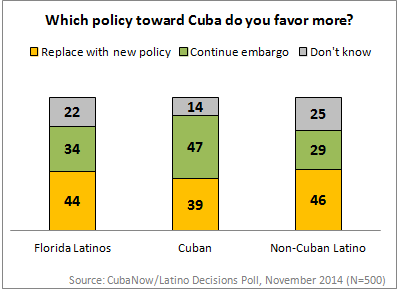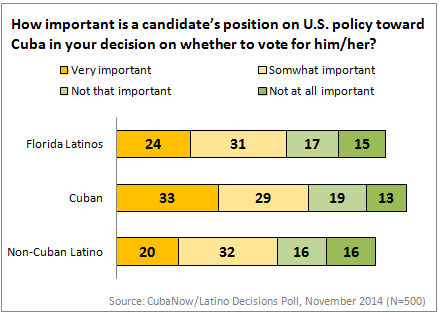Cuba issue significantly less salient – even to Cuban Americans
This month, President Obama took significant steps to normalize relations with Cuba. For over six decades America sought to isolate and cripple the Castro-led regime through an economic embargo that remained in effect because of the support it received from conservative Cuban Americans in Florida. Florida’s pivotal role in presidential elections gave Cuban Americans an exaggerated edge when it came to national politics and dictating American foreign policy toward Cuba. Yet, in recent decades, the political power and size of the conservative wing of Cubans in Florida has declined as a result of an influx of Democratic-leaning Latinos to the state, the growth of younger generations of Cuban Americans, and the increase of newer waves of Cuban migrants. In short, Cuban American hardliners are now out-of-step with the majority of Latinos, including Cuban-Americans, in Florida.
Data collected by the polling firm Latino Decisions and commissioned by #CubaNow (www.cubanow.us) on the eve of the 2014 election show substantial support for changing the U.S.-Cuba relationship among Latino voters in Florida. Respondents were asked which policy toward Cuba they favored more: continuing the current U.S. economic embargo against Cuba with no exceptions, or, replacing the embargo with a policy that continues to pressure Cuban government over human rights but increases engagement between Americans and the Cuban people.
Among all Latino voters participating in the 2014 election in Florida, a plurality (44%) supported a new direction in our relationship with Cuba, while about a third (34%) wanted to keep the embargo and relations as they are, and 22% said they didn’t know.

It is worth noting that the 2014 electorate was more conservative than usual, certainly much more so than in recent presidential elections. Thus, the 2014 electorate represents a best case scenario for those who want to keep the status quo embargo policy. Contrary to conventional wisdom, Cuban-American voters in Florida are actually divided on the issue, representing a significant departure from 20-30 years ago. A majority of Cuban-Americans do not support the embargo, with a large group (39%) of Florida Cubans favoring a new direction, and 14% who were unsure. That left a plurality (47%) who supported the policy of embargo and isolation. That is, less than half of Florida Cuban-Americans participating in the 2014 election favored the policy of embargo and isolation of Cuba. While Cuban-Americans used to represent an overwhelming majority of the Latino vote in Florida, demographic changes have resulted in a much more diverse and dynamic Latino vote where Cubans account for about 35% to 40% of all Latino voters in Florida today. Among non-Cuban Latinos, only 29% support the embargo policy.

Moreover, the issue is of considerably less importance than in years past. In the Latino Decisions Poll, overall, 24% of Latino voters in Florida said the Cuba embargo issue was “very important” compared to 32% who said not important. Among Cuban-Americans, only one in three – 33% said the issue was “very important” – about the same rate for those who said it was not important, 32%. Further, among those Cubans who said the issue was somewhat or very important, there is a divide on whether to continue the embargo (27%) or to replace it with a new policy (25%). The remainder of the Cuban population felt the issue was not that important, or not at all important in choosing how to cast a ballot. When we examine attitudes among all Florida Latinos who felt the issue was important, 29% favored a policy change, compared to only 19% wanting the embargo to remain. The majority of Florida Latinos felt it was not a voting issue.
While our survey provides a snapshot of Latinos and Cuban Americans in Florida on the eve of the 2014 election, it should be noted that other surveys we conducted in the past show that support for the embargo has steadily declined among all segments of the Latino population, including Cuban Americans. For example, in the 2006 Latino National Survey (LNS), Cuban-Americans in Florida were asked if they favored or opposed the U.S. establishing diplomatic relations with Cuba. At the time, 25.7% said they supported the following two options: (1) establish diplomatic relations under the present circumstances and (2) establish diplomatic relations when Fidel Castro is gone, but the regime persists (Castro left office 2 years after the LNS survey). In the election eve poll, support for establishing diplomatic relations jumps to 39%. The 14 percent point shift within 8 years is significant.
Shortly after President Obama’s announcement of a change in U.S.-Cuban relations, Cuban American hardliners like Senator Marco Rubio (R-FL), a likely presidential hopeful in 2016, slammed Obama by calling him “willfully ignorant” and “the worst negotiator” the U.S. has ever had. Yet, another likely presidential hopeful, Senator Rand Paul (R-KY) supported Obama’s position and criticized Rubio by writing, “Seems to me, Senator Rubio is like an isolationist who wants to retreat to our borders and perhaps build a moat. I reject this isolationism. Finally, let’s be clear that Senator Rubio does not speak for the majority of Cuban Americans. A recent poll demonstrates that a large majority of Cuban-Americans actually support normalizing relations between our countries.” The results of our survey show that Senator Rand Paul is indeed correct in his assessment of Cuban-American attitudes. Marco Rubio, like other Cuban-American hardliners, represents a generation that is out-of-step with younger Cubans and the broader Latino electorate in Florida. Looking forward to the 2016 presidential election, U.S. relations with Cuba will not mobilize Cuban-American voters, and to the degree that it does, it will be in support of opening the island to American commerce and values.
About the Poll: Latino Decisions interviewed 500 randomly selected Latino registered voters in the state of Florida from Oct 29th – Nov 3rd, 2014 and contains a margin of error of +/- 4.4 percentage points. Respondents were interviewed by fully bilingual interview staff and given the option to complete the poll in English or Spanish.
Adrian Pantoja, Ph.D. is Senior Analyst for Latino Decisions and Professor of Political Studies and Chicano Studies at Pitzer College, a member of the Claremont Colleges. He is a leading expert in Latino public opinion and voting patterns and his academic research is published in over three-dozen journals and edited volumes. He has delivered nearly one hundred presentations at public forums. He can be reached at: [email protected].

